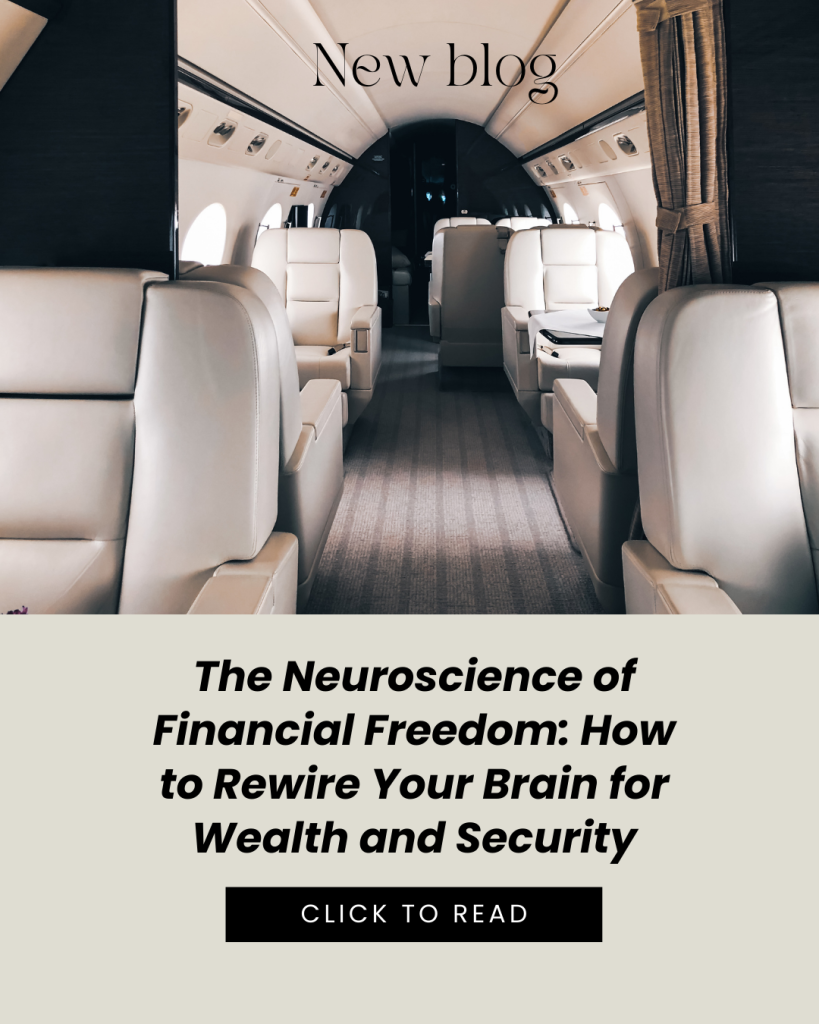Let’s talk about money, not just spreadsheets and savings accounts, but what’s happening in your brain when you think about financial freedom.
Because here’s the truth: your financial habits are not just about discipline or willpower. They’re about wiring.
The way your brain interprets risk, reward, and even future planning can keep you stuck in survival mode… or help you step into long-term wealth and security.
The good news? That wiring can be changed.
Why Money Feels So Emotional
If you’ve ever felt your heart race looking at a bill, or experienced guilt after spending, you know money isn’t just numbers, it’s deeply tied to your nervous system.
That’s because the amygdala, the part of the brain that processes fear, is activated by financial stress. When the amygdala hijacks the system, logical planning (governed by the prefrontal cortex) gets shut down.
In other words, financial anxiety literally makes it harder to think clearly about money.
This is why “just budget better” isn’t enough. If your nervous system associates money with danger or scarcity, your brain will keep pushing you toward short-term relief instead of long-term freedom.
Scarcity vs. Abundance: A Brain-Level Battle
Neuroscience research on scarcity mindset shows that when we feel like we don’t have enough (time, money, resources), the brain narrows its focus. You become hyper-aware of immediate problems, but blind to long-term solutions.
It’s the same reason someone living paycheck-to-paycheck may overspend when extra money finally arrives. The brain craves instant relief from scarcity, even if it sabotages future goals.
Shifting into an abundance mindset isn’t just positive thinking. It’s training your brain to zoom out, engage the prefrontal cortex, and make decisions aligned with the abundant future you want.
The Neuroscience of Rewiring for Financial Freedom
Here are the key neural tools at play when it comes to money:
- Neuroplasticity: Every repeated thought (“I’ll never have enough”) or action (impulse spending) strengthens a neural pathway. Repetition of new patterns (“I’m learning to grow wealth”) gradually rewires the circuit.
- Dopamine Pathways: The brain’s reward system is triggered by both actual gains and the anticipation of reward. That’s why small wins like transferring £50 to savings are so motivating. Each positive action releases dopamine, reinforcing the behaviour.
- Temporal Discounting: This is your brain’s bias toward immediate rewards over future ones. It explains why it’s harder to save than to spend now. Visualising your future self makes that person feel more “real,” which reduces discounting and strengthens long-term choices.
- Mental Accounting: Nobel Prize–winning research by Richard Thaler shows we naturally categorise money in mental “buckets.” Training yourself to create intentional buckets (savings, investing, joy-spending) helps override unhelpful habits.
Practical Steps to Rewire Your Brain Around Money
This isn’t about overnight change. It’s about small, repeatable practices that gradually reset your brain’s relationship with money.
1. Name Your Scarcity Stories
Write down the money messages you grew up with “money doesn’t grow on trees,” “rich people are greedy,” “we can’t afford that.” Awareness breaks their automatic hold.
2. Create Future Self Financial Letters About Wealth
Describe, in vivid detail, what financial freedom looks like for you. Where do you live? How do you spend your mornings? What choices feel available to you? This activates both the RAS and dopamine pathways, making that vision neurologically “stick.”
3. Practise Gratitude with Numbers
Instead of focusing on what’s missing, rewire your brain by noticing what’s working: “I’m grateful I paid my rent this month.” Gratitude shifts the nervous system into safety, helping the prefrontal cortex stay online.
4. Stack Small Wins
Each time you save or invest, celebrate it. The dopamine hit from acknowledging progress reinforces the habit loop, making it easier next time.
5. Reframe Spending with Interoception
Interoception is your brain’s awareness of internal signals (like heartbeat or gut feelings). Next time you’re about to make a purchase, pause and notice how your body feels. Does it feel expansive or contracted? This awareness helps you align money choices with true security, not just impulse.
Why This Matters
Financial freedom isn’t just about a number in your bank account. It’s about feeling safe, empowered, and able to make choices without fear driving the wheel.
When you combine neuroscience tools, from rewiring scarcity loops to celebrating small wins you’re not just managing money. You’re reshaping your brain for long-term wealth and peace of mind.
And when your brain changes, your reality follows.
Because money freedom starts in the mind.
